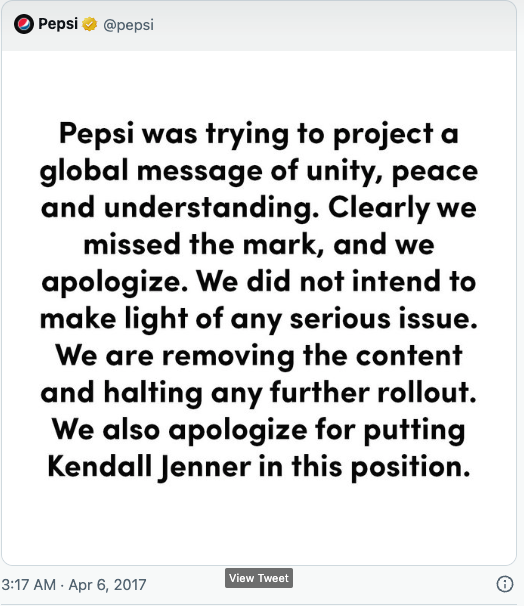What if your business had to “face the music” because an incident has put your reputation on the line?
It could be a simple oversight or even a major mistake that causes an uproar amongst your loyal customers right through to the general public.
Is your business prepared? Would you know what to do to manage the response?
Here we explore what a crisis is, what we can do about one, and what we can learn from the ‘Worst Ad Ever’.
What is a Crisis?
The term crisis should be familiar to all business owners – whether you’re in insurance, retail, legal, a trade, hospitality or any other industry, unexpected problems can arise, and even if it is out of our control – your business needs to be ready to respond.
The most important thing to keep in mind is to focus on what we DO have control over, and how we manage the mistake ideally before or after it occurs.
This is crisis management.
There are a variety of scenarios that may be considered a crisis:
- Technological Breakdowns: System crashes and personal client data being breached and leaked into the real world.
- Recalls and Product Issues: Faulty or dangerously produced products being sent out to consumers.
- Natural Disasters: Floods, hurricanes and earthquakes impacting your business.
- Social Media: Unprofessional, embarrassing or incriminating information being posted and shared online or taken out of context.
- Personal Matters: A rogue staff member portraying your company in bad faith, management attitudes and even substance abuse in the workplace.
How to Deal with a Crisis
So, with these examples in mind, here’re some tips and tricks on how to manage a crisis when it arises.
Acknowledge the Problem at Hand
If you can acknowledge and accept the problem at hand before it escalates or the media gets hold of it, you can manage the damage much more easily.
While it seems simpler to just ignore the issue and hope it goes away, it rarely works – in-fact, it makes it much worse. Pepsi had to learn this the hard way. We’ll take a look at this example a bit later.
Fact-check the Scenario
Fact check the scenario to gain all the information and be prepared to be as transparent as possible to your audience. Show you are taking it seriously, working on the facts and trying to be accountable. Make it clear that you intend to investigate and rectify the situation as best you can.
Find your Channels and Use Them to Reach these Audiences
Consider the appropriate platforms of communication – email, text message, social media, press releases or press conferences, even letters while they’re still relevant… The aim is to create and communicate the narrative that shows the organisation is taking the issue seriously and is investigating and operating in the best interest of its customers and the community.
Use What you’ve Learned to Plan For and Mitigate Any Future Events
Don’t just wait until there is a crisis before you act – be proactive instead of reactive! Review the incident and put measures in place to prevent future issues and strengthen your response plan for next time an incident occurs.
Some businesses are great examples of ticking all these actions off whether before or after a crisis. On the other hand, other businesses have attempted to rectify a crisis by digging in their boots and creating their own facts.
One brand’s campaign is known by many as the ‘Worst Ad of All Time’: let’s take a look at this infamous fizz up from Pepsi.
The Worst Ad Ever
The honour of the title of ‘Worst Ad of All Time’ was earned by soft drink brand giant Pepsi-Cola back in 2017 and it can serve as a case study in crisis management for businesses big and small.
Pepsi made an attempt to recognise and encourage diversity during a time where treatment of different cultures was under the magnifying glass of our society. Pepsi’s aim was for the ad to celebrate their audiences from ‘all walks of life’.
The ad saw US celebrity Kendall Jenner joining a march of angry protestors, with hundreds of frantic citizens striding toward a wall of police officers.
Jenner confidentially approached one of the officers and handed him a can of Pepsi. This was followed by an instant resolution of the protest and potential conflict, with the whole block of angry mobs suddenly celebrating and dancing in bliss and harmony.
Pepsi’s bid to appear ‘woke’ fell flat and resulted in a demanding wake-up call from its audiences. The negative reactions rippled all over the media for its insensitively and falling flat from its goals.
The backlash was immediate and fierce, but in Pepsi’s defence, so was their corporate crisis management.

After some attempts to sugar-coat their ad by endeavouring to bottle the fizzy uproar from their viewers down to the size of their trademark cola can, Pepsi finally admitted they ‘missed the mark’ and pulled the campaign off commercial media platforms, showing their willingness to act, show empathy, accept responsibility, and promising to do better in the future.
It’s here where Pepsi began to manage the crisis effectively and went from their reputation being on the firing line to clawing back some respect from the masses for their ownership and transparency.
Key Learnings
A key learning from the Pepsi experience is to own and manage a crisis right from the outset.
Pepsi is not an isolated case, there are a plethora of crises and PR disasters that businesses can learn from and while the tips we’ve shared are a great start, most businesses will need to give crisis management more than just a passing thought. Pepsi was lucky in that their haste decision to back-track and admit fault was lucky for them, but there are businesses who do not have the luxury of ‘testing the waters’ and getting a second chance.
This is where a Crisis Communication Strategic Plan comes into play.
We recommended dedicating time to reviewing and anticipating your risks, developing a plan, and documenting responses so that in the event your business does find itself in a crisis, everyone knows what needs to be done, how to do it efficiently, and when.
For more information on successful PR and managing a crisis before it happens, get in contact with our team here at Purple Giraffe and see what we can do to help prepare your business, protect your brand, and minimise the impact of any future crisis conflicts your business may face.







